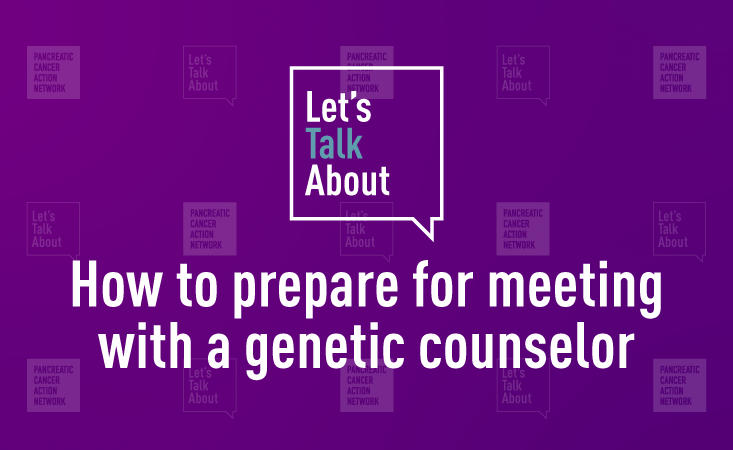
Editor’s note: Our “Let’s Talk About” series continues, focusing on testing as part of our Pancreatic Cancer Awareness Month campaign: “Talk. Test. Take Control. Three simple steps that can save your life.”

Linda Rodgers-Fouché, senior genetic counselor in the Center for Cancer Risk Assessment at Massachusetts General Hospital
Knowledge is power. PanCAN strongly recommends that pancreatic cancer patients talk with their doctor to get genetic testing for inherited mutations and to help in making more informed treatment decisions.
If you are someone who has had a parent, child or sibling diagnosed with pancreatic cancer, contact PanCAN Patient Services to help you understand why you should consider genetic testing for inherited risk.
Here today to discuss preparing for a meeting with a genetic counselor is Linda Rodgers-Fouché, MS, LCGS, a senior genetic counselor in the Center for Cancer Risk Assessment at Massachusetts General Hospital. She specializes in families with gastrointestinal cancers, including pancreatic cancer.
PanCAN: Should I do “homework” prior to my meeting with a genetic counselor? Do I need to know a lot about my family history?
LRF: Knowing your family history is ideal, but not critical. If you have access to or know your family’s medical history, we ask about first-, second-, and third-degree biological/blood-related family members. This means parents, siblings, children, aunts, uncles, grandparents and first cousins on both sides of the family. We will ask more specific questions about the types of cancer diagnosed and the approximate age at diagnosis. It’s also helpful to know if anyone else in the family has already pursued genetic testing and their results. If a relative has tested positive for a gene mutation, we might ask you for a copy of the report. This documentation will help ensure the right test is ordered for you.
PanCAN: What are a few good questions to ask my genetic counselor?
LRF: I encourage anyone considering genetic testing to get in touch with PanCAN Patient Services. They can share resources with you in advance of your visit and help you prepare with questions specific to your concerns. Here are just a few conversation starters:
- Based on my family history, how likely or unlikely is it that I have a genetic alteration associated with cancer risk?
- How will my medical care change if I test positive? Do I need to see other specialists?
- Who will have access to the genetic testing report?
- Am I the best person to test in the family?
PanCAN: How is the specific test that I get determined? Does it matter? Are they all the same?
LRF: There are many different types of genetic tests available. Reviewing family history will help your genetic counselor determine which genes or syndromes would be most appropriate to test for. With a single blood or saliva sample, laboratories can analyze one gene or hundreds of genes. Some individuals prefer to only analyze genes that have been linked to developing pancreatic cancer, while others are interested in broader tests that look at genes linked to many different types of cancer such as pancreas, breast, colon and kidney. We spend time discussing the benefits and limitations of each test and can help you make the decision that’s right for you.
PanCAN: What should I expect at the meeting with my genetic counselor?
LRF: Your genetic counselor will first ask about your concerns to learn why you are considering genetic testing. Then we ask detailed questions about your personal medical history and family history to help assess which genes or syndromes we should be considering. We review the different genes/syndromes, the associated cancer risks of each gene and how medical care might change if results are positive. For example, imaging or other ways to monitor, like blood tests or screening programs, may be options to consider. We also talk about the inheritance pattern and who in the family may also be at risk. The logistics of testing, like sample collection, insurance coverage and the turnaround time for results are all topics we discuss. Once you have all the information you need, together we make a decision about testing. Ultimately, we want the right test for the right person at the right time.
PanCAN: What happens during genetic testing?
LRF: Most genetic testing is performed on a small, one- to two-teaspoon sample of blood or saliva. Once the sample arrives at the laboratory, the DNA is extracted and analyzed. There are three different results that may be reported: positive, negative, or variant of uncertain significance (VUS). Here’s more about each of these three outcomes:
- A positive, also called a “pathogenic variant,” means the laboratory identified an alteration in the gene which affects its normal function. Most of the genes related to hereditary cancer risk are involved in maintaining normal cell division and/or making repairs to DNA. Therefore, if one of these genes is not working properly, it can cause cells to grow out of control, leading to an increased chance of developing cancer. It’s important to note that having a positive result does not mean that you’ll definitely develop cancer.
- A negative means the laboratory did not identify any meaningful changes in the gene.
- A variant of uncertain significance (VUS) means the laboratory does not have enough information to determine whether an alteration in the gene is a benign (harmless) genetic variant or if it is associated with an increased risk of cancer.
Once the laboratory has processed your test, the report will be sent to the provider who ordered the test. We then have a second meeting with you to discuss the results and their implications. Even a negative or VUS result may still be meaningful, so it’s important to have this conversation.
Up next: How to talk to your family about having genetic testing done.





